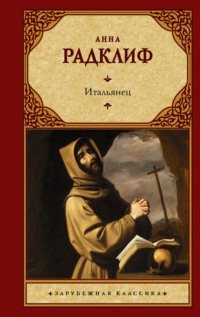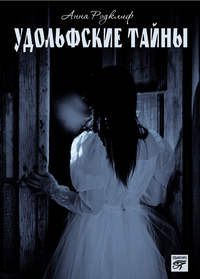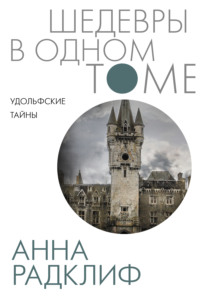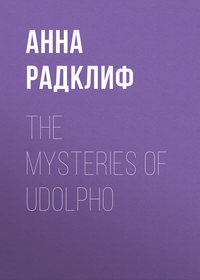
Полная версия
The Mysteries of Udolpho
They travelled leisurely; stopping wherever a scene uncommonly grand appeared; frequently alighting to walk to an eminence, whither the mules could not go, from which the prospect opened in greater magnificence; and often sauntering over hillocks covered with lavender, wild thyme, juniper, and tamarisc; and under the shades of woods, between those boles they caught the long mountain-vista, sublime beyond anything that Emily had ever imagined.
St. Aubert sometimes amused himself with botanizing, while Valancourt and Emily strolled on; he pointing out to her notice the objects that particularly charmed him, and reciting beautiful passages from such of the Latin and Italian poets as he had heard her admire. In the pauses of conversation, when he thought himself not observed, he frequently fixed his eyes pensively on her countenance, which expressed with so much animation the taste and energy of her mind; and when he spoke again, there was a peculiar tenderness in the tone of his voice, that defeated any attempt to conceal his sentiments. By degrees these silent pauses became more frequent; till Emily, only, betrayed an anxiety to interrupt them; and she; who had been hitherto reserved, would now talk again, and again, of the woods and the valleys and the mountains, to avoid the danger of sympathy and silence.
From Beaujeu the road had constantly ascended, conducting the travellers into the higher regions of the air, where immense glaciers exhibited their frozen horrors, and eternal snow whitened the summits of the mountains. They often paused to contemplate these stupendous scenes, and, seated on some wild cliff, where only the ilex or the larch could flourish, looked over dark forests of fir, and precipices where human foot had never wandered, into the glen – so deep, that the thunder of the torrent, which was seen to foam along the bottom, was scarcely heard to murmur. Over these crags rose others of stupendous height, and fantastic shape; some shooting into cones; others impending far over their base, in huge masses of granite, along whose broken ridges was often lodged a weight of snow, that, trembling even to the vibration of a sound, threatened to bear destruction in its course to the vale. Around, on every side, far as the eye could penetrate, were seen only forms of grandeur – the long perspective of mountain-tops, tinged with ethereal blue, or white with snow; valleys of ice, and forests of gloomy fir. The serenity and clearness of the air in these high regions were particularly delightful to the travellers; it seemed to inspire them with a finer spirit, and diffused an indescribable complacency over their minds. They had no words to express the sublime emotions they felt. A solemn expression characterised the feelings of St. Aubert; tears often came to his eyes, and he frequently walked away from his companions. Valancourt now and then spoke, to point to Emily's notice some feature of the scene. The thinness of the atmosphere, through which every object came so distinctly to the eye, surprised and deluded her; who could scarcely believe that objects, which appeared so near, were, in reality, so distant. The deep silence of these solitudes was broken only at intervals by the scream of the vultures, seen cowering round some cliff below, or by the cry of the eagle sailing high in the air; except when the travellers listened to the hollow thunder that sometimes muttered at their feet. While, above, the deep blue of the heavens was unobscured by the lightest cloud, half way down the mountains, long billows of vapour were frequently seen rolling, now wholly excluding the country below, and now opening, and partially revealing its features. Emily delighted to observe the grandeur of these clouds as they changed in shape and tints, and to watch their various effect on the lower world, whose features, partly veiled, were continually assuming new forms of sublimity.
After traversing these regions for many leagues, they began to descend towards Rousillon, and features of beauty then mingled with the scene. Yet the travellers did not look back without some regret to the sublime objects they had quitted; though the eye, fatigued with the extension of its powers, was glad to repose on the verdure of woods and pastures, that now hung on the margin of the river below; to view again the humble cottage shaded by cedars, the playful group of mountaineer-children, and the flowery nooks that appeared among the hills.
As they descended, they saw at a distance, on the right, one of the grand passes of the Pyrenees into Spain, gleaming with its battlements and towers to the splendour of the setting rays, yellow tops of woods colouring the steeps below, while far above aspired the snowy points of the mountains, still reflecting a rosy hue.
St. Aubert began to look out for the little town he had been directed to by the people of Beaujeu, and where he meant to pass the night; but no habitation yet appeared. Of its distance Valancourt could not assist him to judge, for he had never been so far along this chain of Alps before. There was, however, a road to guide them; and there could be little doubt that it was the right one; for, since they had left Beaujeu, there had been no variety of tracks to perplex or mislead.
The sun now gave his last light, and St. Aubert bade the muleteer proceed with all possible dispatch. He found, indeed, the lassitude of illness return upon him, after a day of uncommon fatigue, both of body and mind, and he longed for repose. His anxiety was not soothed by observing a numerous train, consisting of men, horses, and loaded mules, winding down the steeps of an opposite mountain, appearing and disappearing at intervals among the woods, so that its numbers could not be judged of. Something bright, like arms, glanced in the setting ray, and the military dress was distinguishable upon the men who were in the van, and on others scattered among the troop that followed. As these wound into the vale, the rear of the party emerged from the woods, and exhibited a band of soldiers. St. Aubert's apprehensions now subsided; he had no doubt that the train before him consisted of smugglers, who, in conveying prohibited goods over the Pyrenees, had been encountered, and conquered by a party of troops.
The travellers had lingered so long among the sublimer scenes of these mountains, that they found themselves entirely mistaken in their calculation that they could reach Montigny at sunset; but, as they wound along the valley, the saw, on a rude Alpine bridge, that united two lofty crags of the glen, a group of mountaineer-children, amusing themselves with dropping pebbles into a torrent below, and watching the stones plunge into the water, that threw up its white spray high in the air as it received them, and returned a sullen sound, which the echoes of the mountains prolonged. Under the bridge was seen a perspective of the valley, with its cataract descending among the rocks, and a cottage on a cliff, overshadowed with pines. It appeared, that they could not be far from some small town. St. Aubert bade the muleteer stop, and then called to the children to enquire if he was near Montigny; but the distance, and the roaring of the waters, would not suffer his voice to be heard; and the crags, adjoining the bridge, were of such tremendous height and steepness, that to have climbed either would have been scarcely practicable to a person unacquainted with the ascent. St. Aubert, therefore, did not waste more moments in delay. They continued to travel long after twilight had obscured the road, which was so broken, that, now thinking it safer to walk than to ride, they all alighted. The moon was rising, but her light was yet too feeble to assist them. While they stepped carefully on, they heard the vesper-bell of a convent. The twilight would not permit them to distinguish anything like a building, but the sounds seemed to come from some woods, that overhung an acclivity to the right. Valancourt proposed to go in search of this convent. “If they will not accommodate us with a night's lodging,” said he, “they may certainly inform us how far we are from Montigny, and direct us towards it.” He was bounding forward, without waiting St. Aubert's reply, when the latter stopped him. “I am very weary,” said St. Aubert, “and wish for nothing so much as for immediate rest. We will all go to the convent; your good looks would defeat our purpose; but when they see mine and Emily's exhausted countenances, they will scarcely deny us repose.”
As he said this, he took Emily's arm within his, and, telling Michael to wait awhile in the road with the carriage, they began to ascend towards the woods, guided by the bell of the convent. His steps were feeble, and Valancourt offered him his arm, which he accepted. The moon now threw a faint light over their path, and, soon after, enabled them to distinguish some towers rising above the tops of the woods. Still following the note of the bell, they entered the shade of those woods, lighted only by the moonbeams, that glided down between the leaves, and threw a tremulous uncertain gleam upon the steep track they were winding. The gloom and the silence that prevailed, except when the bell returned upon the air, together with the wildness of the surrounding scene, struck Emily with a degree of fear, which, however, the voice and conversation of Valancourt somewhat repressed. When they had been some time ascending, St. Aubert complained of weariness, and they stopped to rest upon a little green summit, where the trees opened, and admitted the moonlight. He sat down upon the turf, between Emily and Valancourt. The bell had now ceased, and the deep repose of the scene was undisturbed by any sound, for the low dull murmur of some distant torrents might be said to sooth, rather than to interrupt, the silence.
Before them, extended the valley they had quitted; its rocks, and woods to the left, just silvered by the rays, formed a contrast to the deep shadow, that involved the opposite cliffs, whose fringed summits only were tipped with light; while the distant perspective of the valley was lost in the yellow mist of moonlight. The travellers sat for some time wrapt in the complacency which such scenes inspire.
“These scenes,” said Valancourt, at length, “soften the heart, like the notes of sweet music, and inspire that delicious melancholy which no person, who had felt it once, would resign for the gayest pleasures. They waken our best and purest feelings, disposing us to benevolence, pity, and friendship. Those whom I love – I always seem to love more in such an hour as this.” His voice trembled, and he paused.
St. Aubert was silent; Emily perceived a warm tear fall upon the hand he held; she knew the object of his thoughts; hers too had, for some time, been occupied by the remembrance of her mother. He seemed by an effort to rouse himself. “Yes,” said he, with a half-suppressed sigh, “the memory of those we love – of times for ever past! in such an hour as this steals upon the mind, like a strain of distant music in the stillness of night;-all tender and harmonious as this landscape, sleeping in the mellow moonlight.” After the pause of a moment, St. Aubert added, “I have always fancied, that I thought with more clearness, and precision, at such an hour than at any other, and that heart must be insensible in a great degree, that does not soften to its influence. But many such there are.”
Valancourt sighed.
“Are there, indeed, many such?” said Emily.
“A few years hence, my Emily,” replied St. Aubert, “and you may smile at the recollection of that question – if you do not weep to it. But come, I am somewhat refreshed, let us proceed.”
Having emerged from the woods, they saw, upon a turfy hillock above, the convent of which they were in search. A high wall, that surrounded it, led them to an ancient gate, at which they knocked; and the poor monk, who opened it, conducted them into a small adjoining room, where he desired they would wait while he informed the superior of their request. In this interval, several friars came in separately to look at them; and at length the first monk returned, and they followed him to a room, where the superior was sitting in an arm-chair, with a large folio volume, printed in black letter, open on a desk before him. He received them with courtesy, though he did not rise from his seat; and, having asked them a few questions, granted their request. After a short conversation, formal and solemn on the part of the superior, they withdrew to the apartment where they were to sup, and Valancourt, whom one of the inferior friars civilly desired to accompany, went to seek Michael and his mules. They had not descended half way down the cliffs, before they heard the voice of the muleteer echoing far and wide. Sometimes he called on St. Aubert, and sometimes on Valancourt; who having, at length, convinced him that he had nothing to fear either for himself, or his master; and having disposed of him, for the night, in a cottage on the skirts of the woods, returned to sup with his friends, on such sober fare as the monks thought it prudent to set before them. While St. Aubert was too much indisposed to share it, Emily, in her anxiety for her father, forgot herself; and Valancourt, silent and thoughtful, yet never inattentive to them, appeared particularly solicitous to accommodate and relieve St. Aubert, who often observed, while his daughter was pressing him to eat, or adjusting the pillow she had placed in the back of his arm-chair, that Valancourt fixed on her a look of pensive tenderness, which he was not displeased to understand.
They separated at an early hour, and retired to their respective apartments. Emily was shown to hers by a nun of the convent, whom she was glad to dismiss, for her heart was melancholy, and her attention so much abstracted, that conversation with a stranger was painful. She thought her father daily declining, and attributed his present fatigue more to the feeble state of his frame, than to the difficulty of the journey. A train of gloomy ideas haunted her mind, till she fell asleep.
In about two hours after, she was awakened by the chiming of a bell, and then heard quick steps pass along the gallery, into which her chamber opened. She was so little accustomed to the manners of a convent, as to be alarmed by this circumstance; her fears, ever alive for her father, suggested that he was very ill, and she rose in haste to go to him. Having paused, however, to let the persons in the gallery pass before she opened her door, her thoughts, in the mean time, recovered from the confusion of sleep, and she understood that the bell was the call of the monks to prayers. It had now ceased, and, all being again still, she forbore to go to St. Aubert's room. Her mind was not disposed for immediate sleep, and the moonlight, that shone into her chamber, invited her to open the casement, and look out upon the country.
It was a still and beautiful night, the sky was unobscured by any cloud, and scarce a leaf of the woods beneath trembled in the air. As she listened, the midnight hymn of the monks rose softly from a chapel, that stood on one of the lower cliffs, a holy strain, that seemed to ascend through the silence of night to heaven, and her thoughts ascended with it. From the consideration of His works, her mind arose to the adoration of the Deity, in His goodness and power; wherever she turned her view, whether on the sleeping earth, or to the vast regions of space, glowing with worlds beyond the reach of human thought, the sublimity of God, and the majesty of His presence appeared. Her eyes were filled with tears of awful love and admiration; and she felt that pure devotion, superior to all the distinctions of human system, which lifts the soul above this world, and seems to expand it into a nobler nature; such devotion as can, perhaps, only be experienced, when the mind, rescued, for a moment, from the humbleness of earthly considerations, aspires to contemplate His power in the sublimity of His works, and His goodness in the infinity of His blessings.
Is it not now the hour,The holy hour, when to the cloudless heightOf yon starred concave climbs the full-orbed moon,And to this nether world in solemn stillness,Gives sign, that, to the list'ning ear of HeavenReligion's voice should plead? The very babeKnows this, and, chance awak'd, his little handsLifts to the gods, and on his innocent couchCalls down a blessing.CARACTACUSThe midnight chant of the monks soon after dropped into silence; but Emily remained at the casement, watching the setting moon, and the valley sinking into deep shade, and willing to prolong her present state of mind. At length she retired to her mattress, and sunk into tranquil slumber.
Chapter V
While in the rosy valeLove breath'd his infant sighs, from anguish free.THOMSONSt. Aubert, sufficiently restored by a night's repose to pursue his journey, set out in the morning, with his family and Valancourt, for Rousillon, which he hoped to reach before night-fall. The scenes, through which they now passed, were as wild and romantic, as any they had yet observed, with this difference, that beauty, every now and then, softened the landscape into smiles. Little woody recesses appeared among the mountains, covered with bright verdure and flowers; or a pastoral valley opened its grassy bosom in the shade of the cliffs, with flocks and herds loitering along the banks of a rivulet, that refreshed it with perpetual green. St. Aubert could not repent the having taken this fatiguing road, though he was this day, also, frequently obliged to alight, to walk along the rugged precipice, and to climb the steep and flinty mountain. The wonderful sublimity and variety of the prospects repaid him for all this, and the enthusiasm, with which they were viewed by his young companions, heightened his own, and awakened a remembrance of all the delightful emotions of his early days, when the sublime charms of nature were first unveiled to him. He found great pleasure in conversing with Valancourt, and in listening to his ingenuous remarks. The fire and simplicity of his manners seemed to render him a characteristic figure in the scenes around them; and St. Aubert discovered in his sentiments the justness and the dignity of an elevated mind, unbiased by intercourse with the world. He perceived, that his opinions were formed, rather than imbibed; were more the result of thought, than of learning. Of the world he seemed to know nothing; for he believed well of all mankind, and this opinion gave him the reflected image of his own heart.
St. Aubert, as he sometimes lingered to examine the wild plants in his path, often looked forward with pleasure to Emily and Valancourt, as they strolled on together; he, with a countenance of animated delight, pointing to her attention some grand feature of the scene; and she, listening and observing with a look of tender seriousness, that spoke the elevation of her mind. They appeared like two lovers who had never strayed beyond these their native mountains; whose situation had secluded them from the frivolities of common life, whose ideas were simple and grand, like the landscapes among which they moved, and who knew no other happiness, than in the union of pure and affectionate hearts. St. Aubert smiled, and sighed at the romantic picture of felicity his fancy drew; and sighed again to think, that nature and simplicity were so little known to the world, as that their pleasures were thought romantic.
“The world,” said he, pursuing this train of thought, “ridicules a passion which it seldom feels; its scenes, and its interests, distract the mind, deprave the taste, corrupt the heart, and love cannot exist in a heart that has lost the meek dignity of innocence. Virtue and taste are nearly the same, for virtue is little more than active taste, and the most delicate affections of each combine in real love. How then are we to look for love in great cities, where selfishness, dissipation, and insincerity supply the place of tenderness, simplicity and truth?”
It was near noon, when the travellers, having arrived at a piece of steep and dangerous road, alighted to walk. The road wound up an ascent, that was clothed with wood, and, instead of following the carriage, they entered the refreshing shade. A dewy coolness was diffused upon the air, which, with the bright verdure of turf, that grew under the trees, the mingled fragrance of flowers and of balm, thyme, and lavender, that enriched it, and the grandeur of the pines, beech, and chestnuts, that overshadowed them, rendered this a most delicious retreat. Sometimes, the thick foliage excluded all view of the country; at others, it admitted some partial catches of the distant scenery, which gave hints to the imagination to picture landscapes more interesting, more impressive, than any that had been presented to the eye. The wanderers often lingered to indulge in these reveries of fancy.
The pauses of silence, such as had formerly interrupted the conversations of Valancourt and Emily, were more frequent today than ever. Valancourt often dropped suddenly from the most animating vivacity into fits of deep musing, and there was, sometimes, an unaffected melancholy in his smile, which Emily could not avoid understanding, for her heart was interested in the sentiment it spoke.
St. Aubert was refreshed by the shades, and they continued to saunter under them, following, as nearly as they could guess, the direction of the road, till they perceived that they had totally lost it. They had continued near the brow of the precipice, allured by the scenery it exhibited, while the road wound far away over the cliff above. Valancourt called loudly to Michael, but heard no voice, except his own, echoing among the rocks, and his various efforts to regain the road were equally unsuccessful. While they were thus circumstanced, they perceived a shepherd's cabin, between the boles of the trees at some distance, and Valancourt bounded on first to ask assistance. When he reached it, he saw only two little children, at play, on the turf before the door. He looked into the hut, but no person was there, and the eldest of the boys told him that their father was with his flocks, and their mother was gone down into the vale, but would be back presently. As he stood, considering what was further to be done, on a sudden he heard Michael's voice roaring forth most manfully among the cliffs above, till he made their echoes ring. Valancourt immediately answered the call, and endeavoured to make his way through the thicket that clothed the steeps, following the direction of the sound. After much struggle over brambles and precipices, he reached Michael, and at length prevailed with him to be silent, and to listen to him. The road was at a considerable distance from the spot where St. Aubert and Emily were; the carriage could not easily return to the entrance of the wood, and, since it would be very fatiguing for St. Aubert to climb the long and steep road to the place where it now stood, Valancourt was anxious to find a more easy ascent, by the way he had himself passed.
Meanwhile St. Aubert and Emily approached the cottage, and rested themselves on a rustic bench, fastened between two pines, which overshadowed it, till Valancourt, whose steps they had observed, should return.
The eldest of the children desisted from his play, and stood still to observe the strangers, while the younger continued his little gambols, and teased his brother to join in them. St. Aubert looked with pleasure upon this picture of infantine simplicity, till it brought to his remembrance his own boys, whom he had lost about the age of these, and their lamented mother; and he sunk into a thoughtfulness, which Emily observing, she immediately began to sing one of those simple and lively airs he was so fond of, and which she knew how to give with the most captivating sweetness. St. Aubert smiled on her through his tears, took her hand and pressed it affectionately, and then tried to dissipate the melancholy reflections that lingered in his mind.
While she sung, Valancourt approached, who was unwilling to interrupt her, and paused at a little distance to listen. When she had concluded, he joined the party, and told them, that he had found Michael, as well as a way, by which he thought they could ascend the cliff to the carriage. He pointed to the woody steeps above, which St. Aubert surveyed with an anxious eye. He was already wearied by his walk, and this ascent was formidable to him. He thought, however, it would be less toilsome than the long and broken road, and he determined to attempt it; but Emily, ever watchful of his ease, proposing that he should rest, and dine before they proceeded further, Valancourt went to the carriage for the refreshments deposited there.








